History 1820 to 1829 Major News and Events, Significant Technology
1820, 1821, 1822, 1823, 1824, 1825, 1826, 1827, 1828 and 1829 History
Major News Events From 1820 to 1829
- 1820 March 15th Maine Becomes the 23rd state.
- 1821 May 5th Napoleon dies on Saint Helena
- 1822 Young and Champollion translate the Rosetta Stone
- 1823 December 2nd The Monroe Doctrine
- 1824 March 11th Bureau of Indian Affairs Created
- 1825 Aluminum Discovered
- 1826 The first photographs
- 1827 March 16th First African American Newspaper
- 1828 January 8th Democratic Party Created
- 1829 June 10th First Oxford University Boat Race
Find More Detailed Information Below
1820
Joseph Smith's vision/Mormon Church, Joseph Smith Jr. saw a vision in Palmyra, New York that began the Mormon Church. He meets two figures, which he calls Personages, in a wood, who introduce themselves as father and son. Smith says that they are 'standing in the air.' They have answered his questions on which church he should join to which they answer 'none.' They have seen that all of the existing churches have corrupted their creeds and have misconstrued the true gospel. His description of the event can be found in Joseph Smith - History, History of the Church Vol. 1, Chapter 1, 16-20.
Maine Becomes the 23rd state, Maine was an enclave of Massachusetts until 1820, when because of the growing population and a political agreement regarding slavery, it became the 23rd state on March 15 under the Missouri Compromise.
1821
Napoleon dies on Saint Helena, Napoleon Bonaparte dies on Saint Helena in the South Atlantic. He was kept there from October 1815 until May 5th, 1821. At Longwood House he had written prose and dictated his last will and testament. One of his 'poems' contained the admission that 'I have stolen the fire of Heaven and made a gift of it to France.'
Missouri Becomes the 24th state, Prior to it joining the Union, Missouri was part of the Missouri Territory. It was admitted as the 24th state of the Union on August 10, 1821.
1822
Young and Champollion translate the Rosetta Stone, Thomas Young had deciphered the means of reading Egyptian hieroglyphs and the meaning of cartouches. His work was extended by Jean-François Champollion, and their analysis of hieroglyphic and hieratic writing was published on this year. Their ability to transpose the scripts (which included Greek) led to their being able to translate hieroglyphic texts. The Rosetta Stone was an Ancient Egyptian artifact created between 204–181 BC, and the text on the stone is a decree from Ptolemy V, describing the repeal of various taxes and instructions to erect statues in temples.
Liberia (denoting “liberty”) , is founded and colonized by freed American slaves with the help of a private organization called the American Colonization Society, on the premise that former American slaves would have greater freedom and equality there. In 1847. Americo-Liberian settlers declared independence of the Republic of Liberia.
1823
The Monroe Doctrine, James Monroe's presidential message of December 2nd had an important effect on American foreign policy. His words, which were later known as the Monroe Doctrine, announced the United States' prevention of further European colonization, an abstention from involvement in European politics and the stopping of Europe's influence in the continent's government.
Mackintosh or Macintosh, Charles Macintosh patented his invention for waterproof cloth made from rubberized fabric in 1823.
1824
Bureau of Indian Affairs Created, The Bureau of Indian Affairs was part of the War Department and had replaced the Office of Indian Trade. Having been created by the Secretary of War it was not recognized by Congress for some time.
San Felipe de Austin, First set up as the unofficial capital of an American Colony set up in Mexico by Stephen F. Austin. The city grew over the next few years and one of the earliest newspapers in Texas, the Texas Gazette, began publication in San Felipe on September 25th, 1829.
1825
Aluminum Discovered, Aluminum is isolated by Hans Ørsted in 1825. He had been able to reduce aluminum chloride with a potassium amalgam, which led to the production of aluminum powder by a German chemist in 1827. His production of metallic aluminum is very noteworthy.
New Harmony, Indiana, Robert Owen sets up his idea of a Utopian Society based on the principle of total equality and banning the ownership of money and commodities. Like all experiments before and since, it failed because of the realities of human nature and the individualities of persons and circumstances and the instinct for self-preservation.
1826
The first photographs, Joseph-Nicéphore Niépce succeeded in recording a light-sensitive image with silver chloride. His partial success was strengthened by his ongoing research into fixing the picture with a kind of asphalt. It was in 1826 that he was able to put a view of his workshop onto a pewter plate.
1827
First African American Newspaper, Freedom's Journal was the first African American newspaper that was published in New York City on March 16th, 1827. Its initial premise was 'to plead for our own cause. Too long have others spoken for us.' The paper was mostly banned in the South (especially after its articles suggested an armed insurrection).
1920's Fashion
Ladies Hats from The Decade
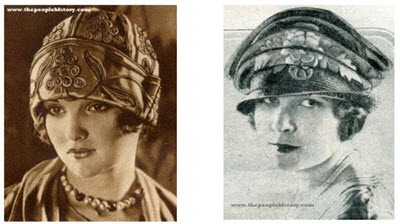
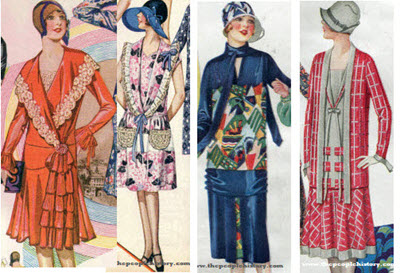
Part of our Collection of Childrens Clothes from the Decade
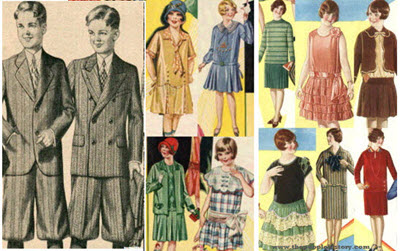
Childrens Toys from The 1920's
Part of our Collection of Toys from The 1920's
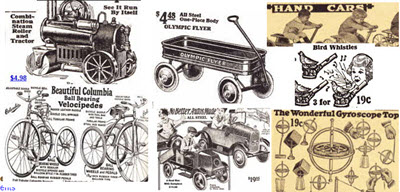
1920s Music
from our 20's Music Page
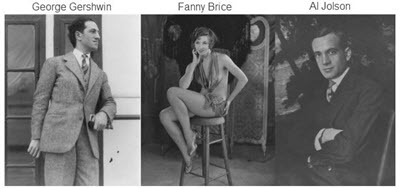
1828
Wellington as Prime Minister, Arthur Wellesley became Prime Minister in 1828, and he supported Catholic emancipation. It was he that passed the legislation that led to 1829's Emancipation Act. There had been the possibility of an Irish rebellion in 1828, and his policies were able to placate their grievances. Daniel O'Connell had refused to take the House of Commons' oath that dismissed Catholicism.
Democratic Party Created, A faction breaks off from the older established Democratic-Republican Party to become the Democratic Party. In the 1828 Presidential Elections opponents of Andrew Jackson told all who would listen that Andrew Jackson was a "Stubborn Jackass" Jackson was proud of his reputation for stubbornness and even wanted to use it as a good quality, so started using a donkey on his campaign posters. Democrats have been using the symbol of the Donkey ever since.
1829
First Oxford University Boat Race, The Oxford University Boat Club ran its first races in 1829. It was based on the Isis (as the Thames is called there) and the scull one was between the crews of Charles Merivale and Charles Wordsworth (the former was a student of St. John's, Cambridge, and the latter at Christ Church, Oxford). Both had been schooled at Harrow.
"Typowriter" or Typewriter, William Austin Burt patented a machine called the "Typowriter" which, in common with many other early similar devices is listed as the "first typewriter", there were many other similar devices, but this device is best described as "the first writing mechanism whose invention was documented."
First Braille Book Published, Louis Braille (who was Blind himself) began inventing his raised-dot system for writing books for the blind in 1821 and published his first Braille book for the blind "Method of Writing Words, Music, and Plain Songs by Means of Dots, for Use by the Blind and Arranged for Them". Braille is read by passing the fingers over characters made up of an arrangement of one to six embossed points.